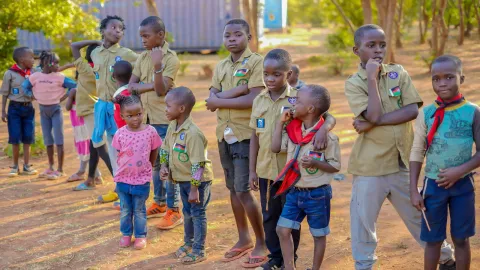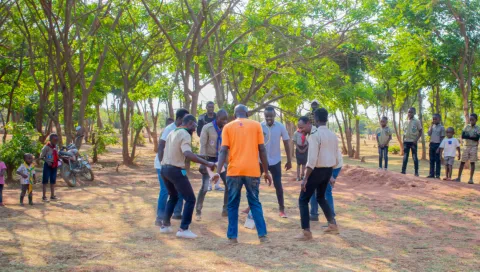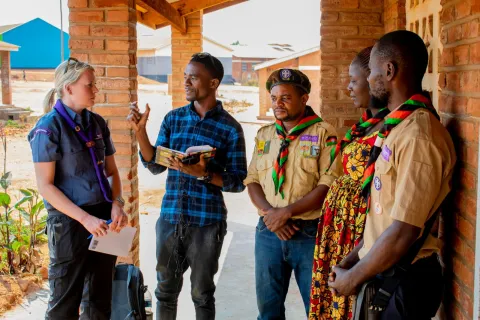Scout Camp in a Refugee Camp: How Scouting is Helping in Malawi
Just outside of Malawi’s bustling capital of Lilongwe, Scout leaders and the Scout Association of Malawi are working together to create a sense of community and offer Scouting activities to hundreds of children and youth living in the Dzaleka refugee camp.
The Scouting activities, run by passionate volunteers who were Scouts in their home countries, are enabling young people to develop the leadership skills and resilience to thrive within the camp, and eventually beyond. The Scouting experience is also offering children and youth a place where they can connect, be part of a community, and have fun amidst the refugee camp’s challenging conditions.

The Dzaleka refugee camp was established in 1994 to provide shelter, protection and support to more than 10,000 individuals with refugee status and asylum seekers who where fleeing their home countries due to various forms of persecution, conflict, and natural disasters. Today, the camp is home to more than 50,000 people, half of whom are children, from countries including the Democratic Republic of the Congo, Burundi, Rwanda, Ethiopia and Somalia.
Over the years, Scouting within the Dzaleka camp has grown organically with limited resources, but has had a significant impact on the lives of young people. Volunteers from diverse Scouting backgrounds have been delivering the Scouting programme using inclusive educational approaches and methods, such as offering activities in local languages.
“I love Scouting very much. I joined Scouting in the Dzaleka camp. I want my friends to join Scouts because it is fun, and Scouting is for good. I have already brought two of my friends to Scouting!” says Marcelline Shabani, a young Scout participating in activities within the camp.
“In addition to the Scouting programme, another important aspect is teaching Scouts how to cope with living here and helping this community. Life in the camp is very difficult,” says Isabella Nina, a Cub Scout Leader.

More recently, the Scout Association of Malawi has drawn on their experience working in rural communities and integrating children and youth into refugee camps to establish more sustainable Scouting programmes within the Dzaleka camp, enabling more young people to access quality education opportunities.
To achieve this goal, the National Scout Organization is implementing a well-tested programme called Ticket to Life, which has been running successfully in other countries such as Bangladesh and the Philippines to integrate children and youth facing particularly challenging circumstances into society through Scouting. Over the past decade, World Scouting's Ticket to Life programme, made possible thanks to the generous support of the Imholz family via the World Scout Foundation, has successfully engaged more than 5,000 young people and has proven its effectiveness in various settings, including refugee camps, slums, conflict areas, and disaster zones.
The Scout Association of Malawi has made significant contributions to life in the Dzaleka camp through the Ticket to Life programme. As a result, Scout Leaders in the camp are now being provided with training and resources for their Scout Groups. This support enables them to enhance their personal growth, as well as engage Scouts in supporting their community and developing life skills. Moreover, the implementation of Ticket to Life has led to a more standardised approach to Scouting within the camp, aligning it with the educational programmes and priorities of Scouting in Malawi.
“I am happy since we had the training which opened our eyes to the many issues of being a Scout Leader. From the training there is a big difference between how Scouts are now and how they were before. A lot has changed and now they even have uniforms. We had a mega-camp for all the children and they really love it,” says Isabella Nina, a Cub Scout Leader who went through the volunteer training programme.
“I was a Scout back in Rwanda, and I am a Scout here. I have been leading this group for 18 months now. Some things we teach the children here are how to help society, and how to assist them to continue their education,” says Innocent, a Scout Leader for Ticket to Life who has been living in the Dzaleka camp for 17 years and is serving as a great role model for other Scouts.
Thanks to the support provided by the Scout Association of Malawi, Scouts in the camp now enjoy increased access to a wider range of activities and opportunities throughout the country. For example, 155 young Scouts from the refugee camp recently had the opportunity to participate in a larger Scouts event held in another community, allowing them to gain new experiences, have fun and make new friends.

Beyond engaging in traditional Scouting activities, Scouts are also developing their employability skills through local trainings and workshops. These initiatives focus on equipping young people with practical skills such as woodworking, making charcoal from waste materials, and learning how to grow and distribute food within the camp community through a Food for Life project.
In the coming months, Scouts aim to expand this initiative into a more extensive project where the food they produce is sold to partners for distribution within the camp. The funds generated from these sales will be reinvested into Scouting, contributing to the long-term sustainability of Scout groups and procurement of essential resources like uniforms for both young Scouts and Adult Leaders.
Inspired by this story? Here’s where you can learn more:
- Submit YOUR service project on the Scouts for SDG hub at sdgs.scout.org
- Find out more about the impact of the Ticket to Life programme in the Africa and Asia-Pacific Scout Regions
- NSOs can check out the Scouting and Humanitarian Action WOSM Service, where there are resources for National Scout Organizations and adult leaders on how to implement Scouting in humanitarian settings